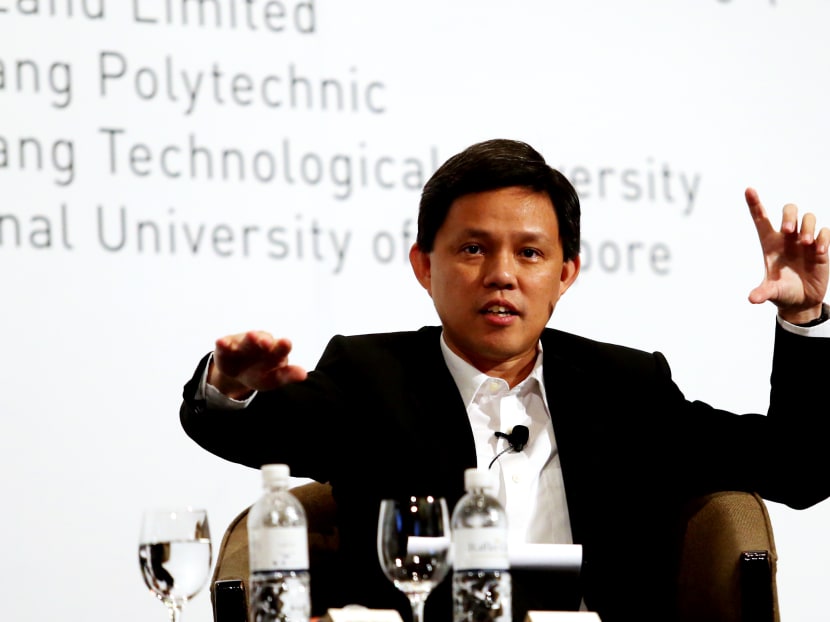Political diversity ‘a strength’, but society should seek consensus
SINGAPORE — Political diversity in society is a “strength” as it allows a nation to “check our own blind spots”, but society must also have the maturity to achieve consensus beyond expressing differing views, said Minister for Social and Family Development Chan Chun Sing.

Minister for Social and Family Development Chan Chun Sing shares his views at a dialogue session at the Institute of Policy Studies’ (IPS) Singapore Perspectives conference today (Jan 26). Photo: Ernest Chua
SINGAPORE — Political diversity in society is a “strength” as it allows a nation to “check our own blind spots”, but society must also have the maturity to achieve consensus beyond expressing differing views, said Minister for Social and Family Development Chan Chun Sing.
Sharing these views at a dialogue session at the Institute of Policy Studies’ (IPS) Singapore Perspectives conference today (Jan 26), Mr Chan, who was asked whether the Government was ready to accommodate the new norm of political diversity, said the key is not diversity per se.
“The key is how we, as a society, achieve convergence after a sharing of those diverse views,” he said. “Perhaps, before we shoot down another person’s view, (we should) sit back and think, ‘why is he or she taking that perspective?’”
“(As) Karl Marx would say: There is thesis, there is antithesis; the question is, can we find a synthesis?” Synthesis, he added, can be achieved only if people put the greater good of society ahead of personal preferences, but this is easier said than done.
The question was one of seven posed to Mr Chan and Deputy Prime Minister Teo Chee Hean at the dialogue, which ran for close to two hours.
Responding to the same question, Mr Teo said the diversity seen today is a luxury that we did not have in the early years.
These views can be tapped to improve the policymaking process, but ultimately those at the helm must make a call. “(One) can’t carry on the conversation indefinitely,” Mr Teo said.
In keeping with the theme of the conference — “Choices” for Singapore — the issues raised by members of the audience ranged from how to drive growth while managing the foreign worker population, to providing for social needs without slipping into populism.
Mr Chan also said that in providing assistance, the ideal has always been “do the most for those with the least”, but the challenge lies in defining this group. The Government, he said, will also have to deal with “human dynamics”, as there will be some lamenting at being left out even though they are not the most in need. There is a need to recognise that “finite resources” are most impactful for the low-income, he pointed out.
Asked whether the Pioneer Generation Package could be extended to include a wider group, Mr Chan said whether a second Pioneer Generation Package could be given out depends on whether a government can muster the resources and the willingness of society to honour the older generation.
He also cautioned against a situation in which elections are turned into an “auction”, where subsidies are wielded as a tool to win votes.
“It is always easy for someone to come and do a one-upmanship, and say that I will promise more. The only way to check against this is not a political system per se, but an enlightened electorate,” he said, adding it is important to pose tough questions, such as how a candidate proposes to balance the books or bring about the promised benefit.
Singapore, he added, needs a “new narrative” beyond basic needs of food, lodging and security and the Government will find a way to “galvanise our society” beyond these needs.
At the same time, Singapore must still remain a land of opportunity for its young, and protect its security and independence.
Asked by IPS senior research fellow Gillian Koh about the Government’s “difficult dilemmas” in balancing slowing down the foreign worker growth rate with its goal to ramp up productivity, Mr Chan pointed out the realities of Singapore’s citizen population, which is small compared with megacities that it has to compete with, such as Beijing or Shanghai.
“In any global economy, in order to be a niche, as part of the global value-added chain, we need to be of a certain size. The question is, can we do that ... I won’t dare say it’s impossible, but I know it’s very difficult.”
While Singapore has no other option but to add more people to Team Singapore, it will be done at a rate the population can assimilate and digest, he said.






